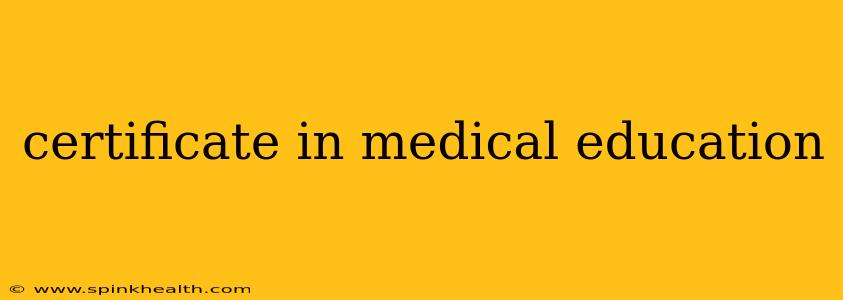The world of healthcare is constantly evolving, demanding innovative teaching methods and a deep understanding of adult learning principles. For medical professionals passionate about sharing their knowledge and shaping the future of medicine, a certificate in medical education is a powerful stepping stone. This isn't just about enhancing your teaching skills; it's about becoming a leader in medical pedagogy, contributing to improved patient care through better-trained healthcare providers. This journey, however, can feel overwhelming, filled with questions about the right program, the time commitment, and ultimately, the return on investment. Let's unravel this journey together.
What is a Certificate in Medical Education?
A certificate in medical education is a specialized credential designed to equip medical professionals with the pedagogical skills and knowledge necessary to excel in teaching roles. These programs delve into various aspects of medical education, including curriculum design, assessment strategies, effective communication techniques, and the nuances of adult learning theory. They often involve a blend of theoretical learning and practical application, allowing participants to refine their teaching abilities through hands-on experience and peer feedback. The specific curriculum varies depending on the institution, but core themes remain consistent.
What are the different types of certificates in medical education?
The landscape of medical education certificates is diverse. Some programs focus broadly on teaching methodologies, while others cater to specific niches like simulation-based training, online medical education, or faculty development. You might find certificates specializing in areas such as:
- Curriculum Development: Designing engaging and effective medical curricula.
- Assessment & Evaluation: Mastering methods for evaluating student learning outcomes.
- Instructional Design: Creating high-quality learning materials, whether in-person or online.
- Medical Simulation: Utilizing simulation technology to enhance training experiences.
- Health Professions Education: A broader focus, encompassing various healthcare disciplines.
The best type of certificate depends entirely on your career goals and interests. A program focused on online education might be ideal if you're looking to create engaging digital learning modules. If you're interested in leading workshops or training programs, a certificate emphasizing teaching methodologies might be a better fit.
What are the benefits of pursuing a certificate in medical education?
The advantages of acquiring a certificate in medical education extend far beyond simply improving teaching skills. It enhances your career prospects, boosts your credibility, and allows you to contribute meaningfully to the medical field's progress.
-
Career Advancement: A certificate can significantly enhance your resume, making you a more competitive candidate for teaching positions in medical schools, residency programs, or continuing medical education (CME) departments.
-
Increased Earning Potential: While not a guaranteed increase, specialized skills often translate to higher earning potential.
-
Enhanced Credibility: The certificate signifies your dedication to excellence in medical education, building your reputation among colleagues and students.
-
Improved Teaching Effectiveness: The program's structured approach provides the tools and knowledge to create engaging and impactful learning experiences.
How long does it take to complete a certificate in medical education?
The duration of a certificate program varies significantly depending on the institution and the program's intensity. Some programs can be completed within a few months, while others may span a year or more. Many programs offer flexible learning options, catering to professionals with busy schedules.
What are the admission requirements for a certificate in medical education?
Admission requirements vary among institutions but usually include a medical degree (MD or DO) or equivalent, and sometimes prior teaching experience. A strong academic record and a statement of purpose outlining your goals and aspirations are commonly required. Check the specific requirements of the program you are interested in.
Is a certificate in medical education worth the investment?
The value of a certificate in medical education is ultimately determined by individual circumstances and career goals. However, for those seeking to advance their careers in medical teaching, enhance their pedagogical skills, and contribute to medical education's ongoing improvement, the investment is frequently well-justified. The increased earning potential, enhanced credibility, and fulfilling career opportunities make it a worthwhile endeavor for many medical professionals.
This journey towards a certificate in medical education is a significant step toward becoming a more effective educator and a leader in shaping the future of healthcare. It's an investment in your professional growth and a contribution to the advancement of the medical field. So, take the plunge, and embrace the challenge. The rewards are well worth the effort.

